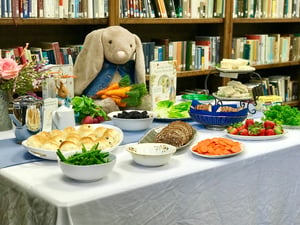 Two chief goals of classical education are to help students become lifelong learners and to give them the tools they need be successful at learning for the rest of their lives. While a person may catch the bug for learning any time in life, there is no better season for inspiring that love of learning right down into a person’s bones than in the early years before he or she becomes a teenager.
Two chief goals of classical education are to help students become lifelong learners and to give them the tools they need be successful at learning for the rest of their lives. While a person may catch the bug for learning any time in life, there is no better season for inspiring that love of learning right down into a person’s bones than in the early years before he or she becomes a teenager.
At classical Christian schools like Trinitas, we attempt to guide students in a way that is consistent with the phase of development they are in. For students in the age range from about four to eight years old this involves more activity than passive receiving of information. The idea is to inspire wonder in them. Some people call it intellectual curiosity, which is a fine term, but even more than being curious, we want them to wonder in awe at the world God has made, to develop the confidence to ask questions of it, and to experience the joy that comes from exploring every inch of it.
The teacher has lots of tools at her disposal; one of the best is the unquenchable memory of a child this age. Little ones are naturally given to singing and rhyming and chanting. Now, this is a fine way to get lots of information into them, but even more importantly, it builds a love for and skill with language. A first grader memorizing Beatrix Potter poetry is a student who is developing a taste for words and how they complement each other, rhymes and the beauty of words dancing harmoniously together or bumping into each other in opposition. A child on a steady diet of poetry and Scripture becomes a student who later is interested in what others have to say and who can also say something eloquently themselves.
Another great tool for inspiring students in this age of wonder is exploration that involves all the senses. It is one thing to memorize and recite poetry about rabbits; it is another thing entirely to spend the morning with a real rabbit, petting it, feeding it, and holding it. Enjoying a tea party with real rabbit food, say lettuce and carrots, adds another layer to the complexity of the lesson. If the blackberries eaten for dessert have a little cream and sugar on them, well, one must make sacrifices to really understand Flopsy, Mopsy, and Cottontail. The idea is to engage all the senses in the learning process, allowing students to explore the nooks and crannies of the lesson, making discoveries on their own that reward their effort. This is the very sort of thing that cultivates a love for learning, that inspires wonder, and that opens a child’s eyes to the fact that there is a great big world out there just waiting for her to crack it open and get at the soft, sweet center.
There are lots of ways to transfer information so a student can pass a test, but inspiring wonder that turns into a lifetime of learning takes a different approach. Classical Christian schools aspire to far more than a transfer of information. We long to transfer a way of life, one that is built on wonder at the world God has made and an appetite to feast on it for the rest of life. Opening the eyes of a child to the glory of God’s creation and giving her the tools to explore it are best started early in life—in the season of wonder.


